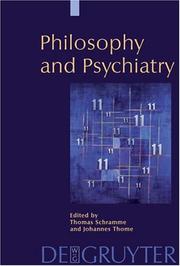| Listing 1 - 8 of 8 |
Sort by
|

ISBN: 0262232146 0262512653 0262285754 1423726677 0262265036 9780262285759 9780262232142 9780262512657 Year: 2009 Publisher: Cambridge, Mass. MIT
Abstract | Keywords | Export | Availability | Bookmark
 Loading...
Loading...Choose an application
- Reference Manager
- EndNote
- RefWorks (Direct export to RefWorks)
Walter applies the methodology of neurophilosophy to one of philosophy's central challenges, the notion of free will. Neurophilosophical conclusions are based on, and consistent with, scientific knowledge about the brain and its functioning.Neuroscientists routinely investigate such classical philosophical topics as consciousness, thought, language, meaning, aesthetics, and death. According to Henrik Walter, philosophers should in turn embrace the wealth of research findings and ideas provided by neuroscience. In this book Walter applies the methodology of neurophilosophy to one of philosophy's central challenges, the notion of free will. Neurophilosophical conclusions are based on, and consistent with, scientific knowledge about the brain and its functioning.Walter's answer to whether there is free will is, It depends. The basic questions concerning free will are (1) whether we are able to choose other than we actually do, (2) whether our choices are made intelligibly, and (3) whether we are really the originators of our choices. According to Walter, freedom of will is an illusion if we mean by it that under identical conditions we would be able to do or decide otherwise, while simultaneously acting only for reasons and being the true originators of our actions. In place of this scientifically untenable strong version of free will, Walter offers what he calls natural autonomy--self-determination unaided by supernatural powers that could exist even in an entirely determined universe. Although natural autonomy can support neither our traditional concept of guilt nor certain cherished illusions about ourselves, it does not imply the abandonment of all concepts of responsibility. For we are not mere marionettes, with no influence over our thoughts or actions.
Free will and determinism. --- Cognitive neuroscience. --- Free will and determinism --- Cognitive neuroscience --- Ethics --- Philosophy --- Philosophy & Religion --- Cognitive neuropsychology --- Compatibilism --- Determinism and free will --- Determinism and indeterminism --- Free agency --- Freedom and determinism --- Freedom of the will --- Indeterminism --- Liberty of the will --- Cognitive science --- Neuropsychology --- Determinism (Philosophy) --- Neurosciences. --- NEUROSCIENCE/General --- PHILOSOPHY/General --- Neural sciences --- Neurological sciences --- Neuroscience --- Medical sciences --- Nervous system --- Philosophical anthropology
Book
ISBN: 3897850524 Year: 1999 Publisher: Paderborn Mentis
Abstract | Keywords | Export | Availability | Bookmark
 Loading...
Loading...Choose an application
- Reference Manager
- EndNote
- RefWorks (Direct export to RefWorks)
Book
Year: 1990
Abstract | Keywords | Export | Availability | Bookmark
 Loading...
Loading...Choose an application
- Reference Manager
- EndNote
- RefWorks (Direct export to RefWorks)
Book
Year: 1988 Publisher: Kiel
Abstract | Keywords | Export | Availability | Bookmark
 Loading...
Loading...Choose an application
- Reference Manager
- EndNote
- RefWorks (Direct export to RefWorks)
Multi
ISBN: 9783662657744 9783662657737 9783662657751 9783662657768 Year: 2023 Publisher: Berlin Springer
Abstract | Keywords | Export | Availability | Bookmark
 Loading...
Loading...Choose an application
- Reference Manager
- EndNote
- RefWorks (Direct export to RefWorks)
The textbook builds a bridge between the "neurosciences" (theoretical and experimental neurobiology, neurology) and the "psychosciences" (psychology, psychiatry, psychotherapy) and aims to help provide the other disciplines with the most important and scientifically validated knowledge in an understandable form. The question of how mental experience and brain processes relate to each other has long been considered mysterious. In this book you will learn, based on the latest scientific findings, that the two areas form an indissoluble unity, even if we experience and study them differently. We present this unity in concrete terms in psychological-neurobiological theory and psychiatric-psychotherapeutic practice. We treat the principles of neurobiological excitation and information processing, the structure and function of the limbic system, the development of the personality and the interaction of genetic-epigenetic factors and prenatal and postnatal environmental influences, which may be favourable or unfavourable. On this basis, the exemplary presentation of important mental disorders such as addictive disorders, schizophrenic disorders, affective disorders and anxiety disorders takes place. Finally, following in the footsteps of the eminent psychotherapist Klaus Grawe, the concept of "neuropsychotherapy" is introduced and it is shown why psychiatry-psychotherapie and neurobiology belong together and can enrich each other. Our psychoneuroscientific approach paints a picture of man that is not based on opposites, but on an integration of psyche, brain, behavior and experience. The editors Prof. Dr. phil. Dr. rer. nat Gerhard Roth researches and teaches at the Institute for Brain Research, University of Bremen. "Psyche, personality and brain form an inseparable unit, even if we experience them differently". Prof. Dr. med. Dr. phil. Andreas Heinz is Clinic Director at the Department of Psychiatry and Psychotherapy at Charité Berlin. "The interplay of neurobiology, behavior and subjective experience is illuminated by new methods and models." Prof. Dr. med. Dr. phil. Henrik Walter heads the research area "Mind and Brain" at the Department of Psychiatry and Psychotherapy at Charité Berlin and is the deputy medical director of the clinic. "Neuroscience education in the practice of psychiatry and psychotherapy is increasingly becoming a matter of course - and that's a good thing." This book is a translation of an original German edition. The translation was done with the help of artificial intelligence (machine translation by the service DeepL.com). A subsequent human revision was done primarily in terms of content, so that the book will read stylistically differently from a conventional translation.
Psychology --- Zoology --- Neuropathology --- neurologie --- neuropsychologie --- zoölogie
Book
ISBN: 396975142X Year: 2020 Publisher: Boston : BRILL,
Abstract | Keywords | Export | Availability | Bookmark
 Loading...
Loading...Choose an application
- Reference Manager
- EndNote
- RefWorks (Direct export to RefWorks)


ISBN: 3110905760 3110178001 3111800997 9783110905762 9783110178005 Year: 2012 Publisher: Berlin Boston
Abstract | Keywords | Export | Availability | Bookmark
 Loading...
Loading...Choose an application
- Reference Manager
- EndNote
- RefWorks (Direct export to RefWorks)
Philosophie und Psychiatrie teilen viele Problemfelder und Fragestellungen. So zeitigen z.B. die "Lösungen" der Psychiatrie des philosophischen Leib-Seele-Problems direkte Auswirkungen auf das Selbstverständnis der Disziplin. Trotz dieser offensichtlichen Überschneidungen wurde im Vergleich zum angelsächsischen Sprachraum in Deutschland bislang wenig interdisziplinäre Forschung zur "philosophischen Psychopathologie" betrieben. Die vorliegende Anthologie schließt diese Lücke, denn die Autoren - sowohl ausgewiesene Fachleute als auch junge Wissenschaftler, die mit neuen Ansätzen zukunftsträchtige Perspektiven eröffnen - kommen aus beiden Disziplinen. Die einzelnen Beiträge setzen sich mit philosophischen Debatten auseinander, wie sie sich im Kontext psychiatrischer Theorie und Praxis ergeben. Philosophy and psychiatry share many topics and problems. For example, the "solutions" of the psychiatry of the philosophical body-soul problem have direct effects on the self-image of the discipline. Despite these obvious overlappings, and unlike the English-speaking countries, interdisciplinary research on "philosophical psychopathology" has been scarce in Germany. The current anthology closes these gaps, because the authors - renowned experts as well as young scientists, whose new approaches open promising perspectives - come from both disciplines. The individual contributions deal with philosophical debates as they arise within the context of psychiatric theory and practice.
Philosophy. --- Psychiatry -- Philosophy. --- Psychiatry --- Behavioral Sciences --- Medicine --- Humanities --- Behavioral Disciplines and Activities --- Health Occupations --- Disciplines and Occupations --- Psychiatry and Psychology --- Philosophy --- Health & Biological Sciences --- Psychiatry - General --- Psychology and philosophy --- Psychologie et philosophie --- Psychiatrie --- Philosophie --- Mental philosophy --- Psychiatry.
Book

ISBN: 3110270722 9783110270723 3110270714 Year: 2013 Publisher: Berlin Boston
Abstract | Keywords | Export | Availability | Bookmark
 Loading...
Loading...Choose an application
- Reference Manager
- EndNote
- RefWorks (Direct export to RefWorks)
Optogenetics combines genetic engineering with optics to observe and control the function of cells using light, with clinical implications for restoration of vision and treatment of neurological diseases. As a new discipline much of the basic science and methods are currently under investigation and active development, thus there is a strong need for introductory literature in this field. This graduate level textbook provides an overview of the field of optogenetics in 5 concise chapters: Optogenetic tools, Applications in cellular systems, Mapping neuronal networks, Clinical applications and
Electrooptical devices. --- Neural networks (Neurobiology) --- Neural transmission. --- Physiological optics. --- Optics, Physiological --- Optics --- Vision --- Nerve transmission --- Nervous transmission --- Neurotransmission --- Synaptic transmission --- Transmission of nerve impulses --- Neural circuitry --- Neurophysiology --- Neurotransmitters --- Biological neural networks --- Nets, Neural (Neurobiology) --- Networks, Neural (Neurobiology) --- Neural nets (Neurobiology) --- Cognitive neuroscience --- Neurobiology --- Electric apparatus and appliances --- Optical instruments --- Integrated optics --- Optoelectronic devices --- Biophysics. --- Genetic Engineering. --- Neuroscience. --- Optics. --- Vision Restoration.
| Listing 1 - 8 of 8 |
Sort by
|

 Search
Search Feedback
Feedback About UniCat
About UniCat  Help
Help News
News